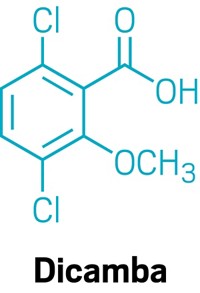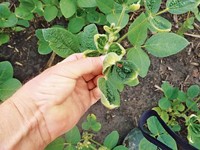Advertisement
Grab your lab coat. Let's get started
Welcome!
Welcome!
Create an account below to get 6 C&EN articles per month, receive newsletters and more - all free.
It seems this is your first time logging in online. Please enter the following information to continue.
As an ACS member you automatically get access to this site. All we need is few more details to create your reading experience.
Not you? Sign in with a different account.
Not you? Sign in with a different account.
ERROR 1
ERROR 1
ERROR 2
ERROR 2
ERROR 2
ERROR 2
ERROR 2
Password and Confirm password must match.
If you have an ACS member number, please enter it here so we can link this account to your membership. (optional)
ERROR 2
ACS values your privacy. By submitting your information, you are gaining access to C&EN and subscribing to our weekly newsletter. We use the information you provide to make your reading experience better, and we will never sell your data to third party members.
Environment
EPA restricts dicamba herbicide
Manufacturers agree to change labels to limit spray drift
by Britt E. Erickson
October 18, 2017
| A version of this story appeared in
Volume 95, Issue 42

In the wake of thousands of complaints of damage to crops in the U.S. from the herbicide dicamba drifting off of neighboring fields, the Environmental Protection Agency and pesticide makers have reached an agreement to impose restrictions on the herbicide’s use.
Dicamba products sold for the 2018 growing season will be classified as restricted use, meaning they can only be applied by a certified applicator with special training. Other changes include limiting dicamba spraying to when winds are less than 16 km/hour, restricting spraying to certain times of the day, and requiring farmers to keep records of dicamba use.
Farmers are increasingly spraying dicamba on soybeans and cotton that have been genetically engineered to tolerate it, as weeds are becoming resistant to other herbicides such as glyphosate. But soybeans that have not been genetically engineered to tolerate dicamba are particularly susceptible to its damage.
State agencies in Arkansas, Illinois, Missouri, Ohio, and Tennessee worked with EPA and pesticide manufacturers to investigate complaints of dicamba damage to nontolerant crops since 2015. Dicamba manufacturer Monsanto is confident that increased training and record keeping will “address the main causes of off-target movement,” says Ty Vaughn, Monsanto’s global regulatory lead. EPA says that it will monitor whether the changes reduce dicamba damage to nontarget crops as the agency decides whether to allow use of the herbicide beyond 2018.






Join the conversation
Contact the reporter
Submit a Letter to the Editor for publication
Engage with us on Twitter